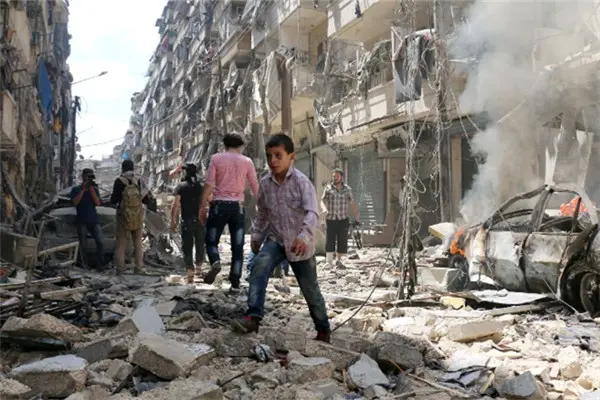In the eerily ravaged old city of Aleppo, nothing indicates the existence of life, but the flute sound of a 70-year-old man, known as Abu Nadim.
Despite the unimaginable destruction that has befallen the old quarter of the northern city of Aleppo, Abu Nadim didn't leave the old city, simply because he has no one to turn to.
He is left there like any rock in that oldest part of the city, which was a popular attraction for tourists keen to see 8,000 years of history.
A soldier in the Bab al-Faraj area told Xinhua that Abu Nadim doesn't talk to anyone, but to himself. He plays traditional Aleppan pieces for the few people who live there, some give him a small amount of money or cigarettes.
Sitting on what used to be a sidewalk, Abu Nadim played several musical pieces of the famous Aleppan singer Sabah Fakhri, while wearing chubby cloth with a blue hat, and plastic slippers.
In Bab al-Faraj, a neighborhood in the old city of Aleppo, there used to be 150 families, but after the war and the constant mortar shelling from rebels controlling nearby parts of that old city, the number of families has shrunk to 15 only.
Um Mahmoud Bitar is a widow. The rough times left her with nine children, one of them died by a mortar shell last year.
The 45-year-old woman is now living in what used to be a shop, after her house was destroyed in an adjacent street, when an explosive-rigged gas cylinder slammed into her building.
"I have lived in this area for over 25 years. My son was killed and I have lost everything when my house was destroyed. We are now living in a shop, which doesn't even belong to us, but the owners allowed us to stay in it," she told Xinhua.
The woman said she has no income and she lives on donations from charity.
The shop that she resides at has no water or electricity.
Speaking about the pre-war times, Bitar said "ahead of the crisis, our situation was very good, our area was so beautiful, among the best in the old city."
"I am raising my kids now with humiliation, hunger and thirst. I want nothing, but a place to rest in along with my kids in peace. I just want the peace of mind. I want nothing more," she said.
A Syrian boy rides a horse as Syrian children play in the street in a rebel-held area of the northern Syrian city of Aleppo as they celebrate the Eid al-Adha (Feast of the Sacrifice) holiday on the first day of a fragile ceasefire on September 12, 2016.. Photo: AFP
Her neighbor Um Amina said she had lost her daughter a few months ago, when a mortar shell fired by the rebels slammed their house. "When the mortar shell struck our home, her hand was sliced open and she later died. She was all I had got, I am now alone. I have a brother who comes to visit me from time to time," she said.
Um Amina also lives on the donations she receives from humanitarian organization every four months.
Those people are from the few who are still living in old Aleppo. They said they cannot leave that area, because all of their history is there, and because they cannot afford to move out.
Samer, a solider from Bab al-Faraj, told Xinhua that even though a large number of families left the area after their homes were destroyed by the constant shelling, he will not leave his home, "simply because this is my neighborhood and I will never leave it."
Samir said the families there live in harmony and take care of one another. "For me, I don't go to bed before checking on Um Amina and see what she may need," he said.
Muhammad Zakariah, a tailor, said his family worked in the cloth-making industry for over 40 years, and he is the only tailor left in old Aleppo.
Before the war, they used to make casual cloth, mainly hats, but when the area has become largely a military one, he chose to make hats, but the military caps.
Sitting behind his sewing machine, Zakariah said he needs to keep his work going, but his customers are now soldiers, not civilians.
The old city is the historic center of Aleppo, which was constructed during the 12th to the 16th century.
During the Syrian war, around 70 percent of old city, which has become divided between the Syrian government forces and the rebels, have been destroyed.
In recent days, the U.S. and Russia have brokered a ceasefire in Aleppo, which helped in a sharp decline of violence in the war- torn country.
(APD)
 简体中文
简体中文

